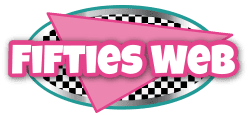Rock’ n’ roll music revolutionized society in the 1950s.
It captured the hearts of young people worldwide with its energetic rhythms, rebellious lyrics, and charismatic performers. It allowed teenagers to rebel against conservative values but also introduced some new fashion trends that were popular decades after its emergence.
Rock and roll music influenced fashion, film, literature, and art, shaping the cultural landscape of the 1950s and beyond.
Thanks to rock and roll, young people worldwide could express themselves through daring clothing styles, eccentric hairstyles, and unusual statement accessories. The non-conformity, leather, denim, and rockabilly fashion of the 1950s expressed the spirit of the music and authenticity of the generation.
It was a revolutionary period that changed how people lived their lives.
If you’re curious about 1950s rock n roll fashion, look no further; we can time travel together to explore the most popular clothing accessories and the origin of this unique music.
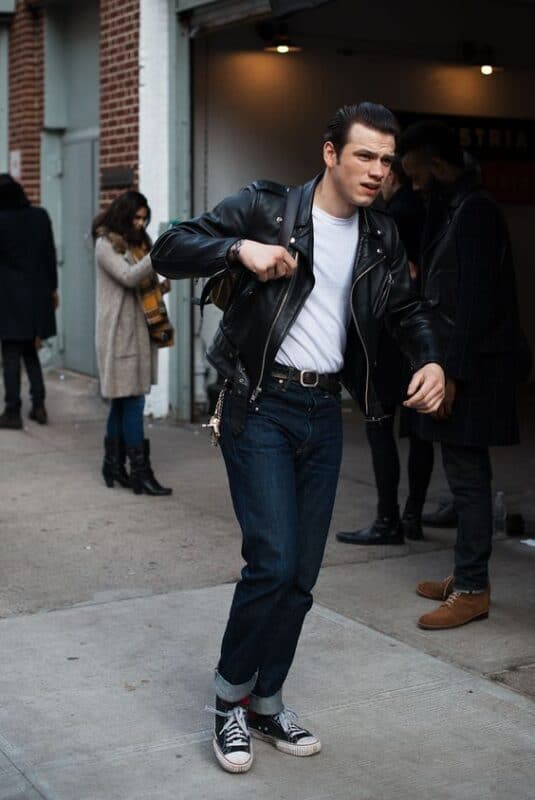
Credits: meninthistown.com /Pinterest
Key Takeaway
- Rock and roll music, which emerged in the 1950s, significantly influenced fashion, culture, and society.
- Iconic musicians such as Chuck Berry, Little Richard, and Elvis Presley played a crucial role in shaping the sound and style of rock and roll, inspiring fans to emulate their unique fashion choices.
- The influence of 1950s rock and roll fashion continues to inspire modern subcultures and vintage enthusiasts, representing individualism, non-conformity, and defiance against societal norms. This era’s style was heavily influenced by famous musicians in the 1950s, whose iconic looks and rebellious attitudes set lasting trends.
.
The Birth of Rock and Roll

Credits: pakawatboomblog.tumblr.com/Pinterest
So, where to begin with?
It all began in the 1940s and 1950s when musicians blended various styles like rhythm, blues, gospel, country, and jazz.
African Americans were important in introducing rhythm and blues, which became the foundation of rock and roll, while country and Western music also played a significant role in its development.
Moreover, the emotional gospel singing style strongly influenced many rock and roll singers, and the guitar techniques of blues also contributed to this unique musical style.
Several musicians shaped the sound and style of rock and roll:
Chuck Berry, aka “Father of Rock and Roll,” played a huge role in the development of early rock and roll music. He was an incredible guitarist, famous for his catchy riffs, rhythmic chord progressions, and dynamic solos.
His lyrics were witty and relatable, capturing the essence of teenage rebellion and youthful dreams as he sang about everyday life, romance, and the joys of being young. And let’s not forget his amazing stage presence – he was always full of energy and charisma!
Little Richard was another important artist who contributed to the development of rock and roll. He was a fantastic singer with a powerful vocal style that set him apart from others in the genre.
He was also a virtuoso pianist whose energetic playing added a unique flavor to his music. And let’s not forget his glamorous outfits and extravagant hairstyles that broke down barriers and inspired future generations of rock stars to embrace their individuality and express themselves freely.
And, of course, we can’t forget the King of Rock and Roll, Elvis Presley.
Thanks to his diverse musical influences – pop, blues, country, and gospel – he appealed to a broad audience and bridged cultural and racial divides.
He had amazing vocal abilities and sang with a lot of emotion. But most importantly, his stage appearance helped him revolutionize both music and fashion!
Elvis Presley was known for his unique stage performances. His hip-shaking dance and suggestive gestures while singing “Jailhouse Rock” and “Heartbreak Hotel” set the new standard for live entertainment.
He was not afraid to experiment with clothes, as he introduced leather and suede, and was wearing collar-up shirts, or jumpsuits, sometimes adorned with sequins and rhinestones.
Thanks to Elvis Presley, pompadours, sideburns, and ducktails became the most popular hairstyles in rock. Presley’s unique look inspired many fans to emulate him, resulting in the global popularity of these iconic hairstyles and clothing.
Rise of Rock and Roll Culture
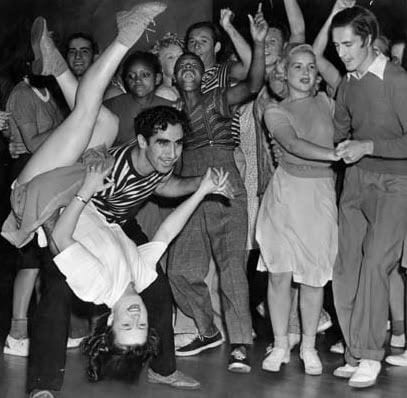
Credits: swungover.wordpress.com/Pinterest
Teenagers widely recognized rock n roll music at the time.
They loved music but also adopted the fashion and lifestyle of their favorite musicians to express their independence and non-conformity.
Some of the most influential rockers, like Chuck Berry and Little Richard, were known for their unique styles. They often wore collared shirts, tailored suits, and blazers, and Little Richard even made bright and vibrant colors popular with his eye-catching designs.
Accessories and jewelry also became a part of the rock ‘n’ roll fashion scene.
Young men all over America were inspired by their favorite musicians and started wearing black leather jackets, white T-shirts, and jeans to emulate their style. This led to the emergence of new subcultures like the Greasers in the US and the Teddy Boys in the UK, which incorporated rock ‘n’ roll fashion accessories into their looks.
Teddy Boys wore slim-fit trousers and tailored jackets with fitted waist. Girls of the subculture wore pleated skirts, button-down shirts, and oversized jackets.
Iconic Rock and Roll Fashion Trends
Are you curious about rock n roll fashion? Well, let me tell you all about it!
Rock n roll fashion is all about iconic trends that were very popular among teenagers, especially rockabilly fashion. In those days, teenagers used to wear clothes that their favorite artists wore, which made them feel edgy and rebellious.
Men’s Fashion
Guys usually complete their look with cuffed jeans, white T-shirts, and leather jackets. These jackets were associated with rebellion, non-conformity, and belonging to rockabilly or other subcultures.
Some teenagers even wore bowling shirts as their favorite musicians. They also sported slicked-back hairstyles and quiffs to complete their look.
Women’s Fashion
As for women, they also wore rockabilly dresses, pencil skirts, and fitted tops. The hairstyles among women were victory rolls, bumper bangs, or similar hairstyles that sexy pin-ups of the time wore.
Make-up was also an important part of rockabilly fashion, so they featured bold winged eyeliner and red lipstick with defined brows.
Fashion Icons of the 1950s
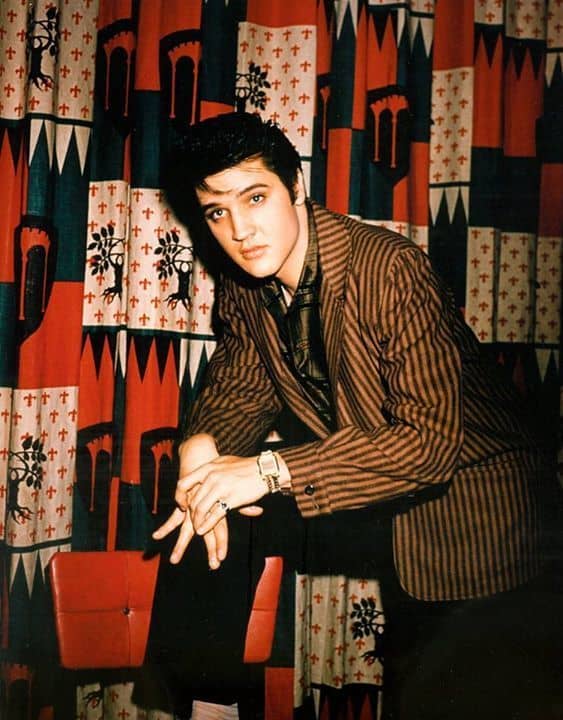
Credits: graceland.com/Pinterest
Fashion icons of the 1950s were the role models of young people at the time. Elvis Presley, Buddy Holly, Johnny Cash, and Little Richard were some of the most important trendsetters of that time. And it wasn’t just musicians—Hollywood rebels like James Dean also significantly influenced the edgy and rebellious look that many young people adopted.
Female artists like Wanda Jackson, who played rockabilly, were pioneers in setting style trends. It’s worth mentioning the iconic Marilyn Monroe, too – her fashion sense inspired girls who wanted to add elegant and sexy details to their rock and roll outfits.
The Impact of Rock and Roll Hairstyles and Accessories
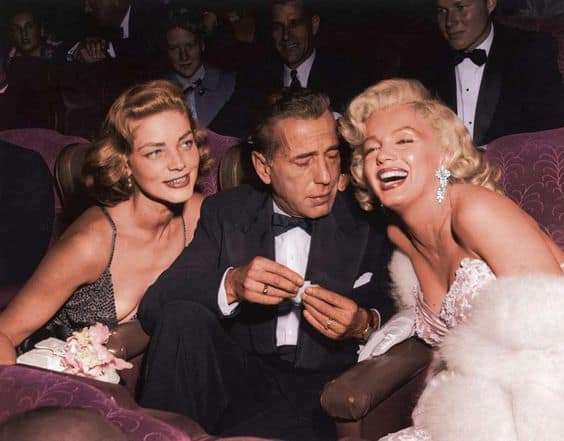
Credits: ranker.com/Pinterest
Rock and roll fans had outfits essential to their subculture, and their hair was a defining feature that helped them feel a sense of belonging.
The King of Rock and Roll, Elvis Presley, popularized the pompadour hairstyle, one of the era’s most well-known haircuts.
He often wore slicked-back hairstyles, using hair gel or pomade to style his hair smoothly. Similarly, Little Richard also sported pompadours, quiffs, and slicked-back hair while sometimes opting for short and tousled styles with curls framing his face.
Rockabilly girls also had unique hairstyles such as Victory rolls, Bettie Page bangs, pin curls, and rockabilly updos, which were the most common among them.
We can’t forget the accessories synonymous with rock and roll style. Most rock and roll fashion enthusiasts wore bandanas and scarves tied around their necks, heads, or wrists.
Sunglasses were important to add a cool and mysterious edge, and most rock and roll fans and stars wore eye-catching jewelry, such as chain necklaces or chunky rings and statement earrings.
Chuck Taylor All-Stars were also essential shoes.
Evolution of Rock and Roll Fashion Beyond the 1950s
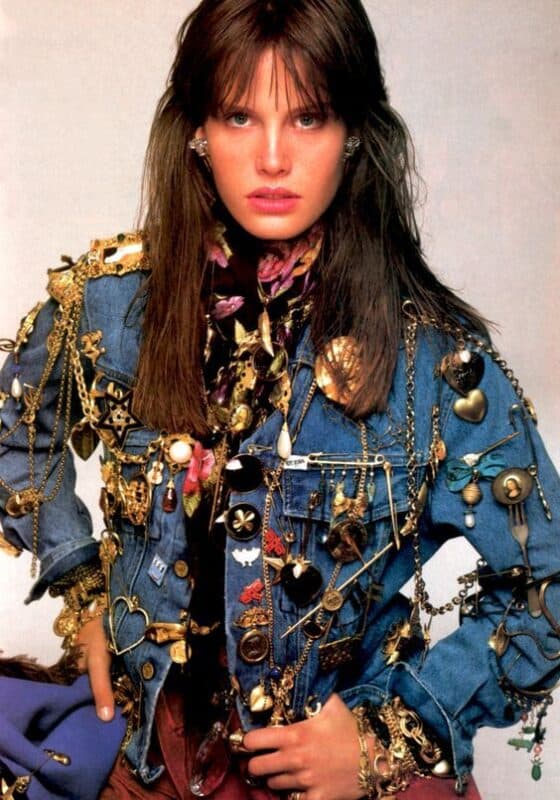
Credits: northerncalstyle.com/Pinterest
Rock and roll fashion is still going strong in modern times.
Although it may have evolved and changed a bit, many people worldwide still love to sport the iconic way of dressing to express their sense of belonging.
Today, many subcultures want to represent their non-conformity, defiance against the mainstream norms, and sense of belonging. Punk rock, heavy metal, goth, and grunge fans wear unique outfits that distinguish them from the mainstream standards.
They usually incorporate elements of vintage rock and roll fashion.
If you want to add rock and roll flair to your wardrobe, a black leather jacket is a must-have accessory.
Denim jeans, layered necklaces, fishnet tights, chains, and ripped clothes are only some of the most important accessories that every modern rock and roll teenager wears. Chunky combat boots or platform boots also add a rebellious edge to modern outfits.
Band t-shirts and hoodies are staple features of modern rock and roll wear.
Nostalgia for the rock and roll era is evident in vintage fashion and retro-inspired looks.
Many modern pin-ups and Greasers wear hairstyles, shoes, and clothing that were popular in the ’50s. Varsity jackets, Bettie Page bangs, Victory rolls, and slicked-back hairstyles are usually things that vintage lovers wear.
No wonder many want to revive this unique fashion, considering the powerful and important rock and roll scene in the 1950s.
Conclusion
The rock and roll fashion trend of the 1950s was not just a passing fad but a highly influential movement that still inspires modern clothing combinations and young generations worldwide.
The rockabilly style spread like wildfire across America and gained immense popularity in various European and Asian countries, giving rise to numerous subcultures.
Today, this style inspires individuals to express their unique identities and become part of the ever-evolving underground scene. Even in modern times, the message remains the same – this clothing style represents individualism, non-conformity, and defiance against societal norms.
It gives a sense of freedom and will remain a fashion trend for generations to come.
